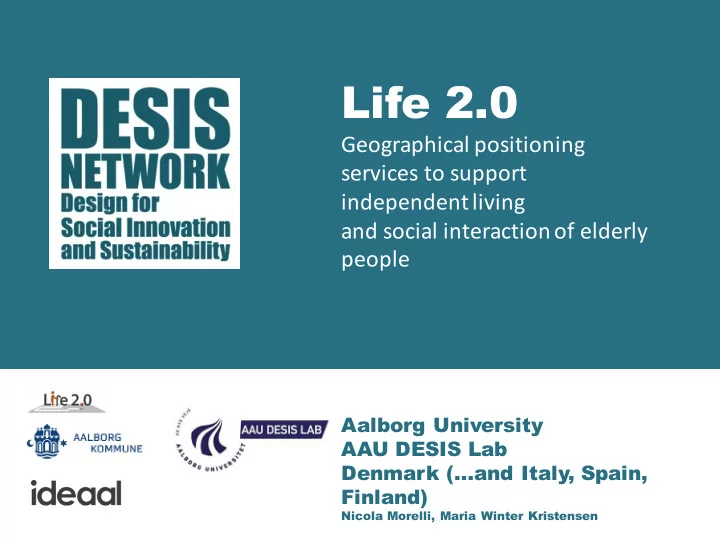

Life 2.0 Geographical positioning services to support independent living and social interaction of elderly people Aalborg University AAU DESIS Lab Denmark (…and Italy, Spain, Finland) Nicola Morelli, Maria Winter Kristensen
PROMOTERS Aalborg University North Karelia University - Centre for Design and International Business - D'ART Politecnico di Milano Universitat Pompeu Fabra Aalborg Komune / North Denmark EU-Office Net technologies Agora Telecom Italia Net Technology Fundacio Privata i2CAT Fondazione Housing Sociale FUNDER European Commission Competitiveness and innovation framework Program
Context. Ageing population is increasing and the Danish government is promoting strategies to support elderly people’s independent living. Elderly people are busy in their own neighbourhood, meeting in training centres, organising activities and events. But somtimes they also feel weak or isolated, especially when living home alone…
Life 2.0 Is a geolocated social network that create a new layer of interaction (beside personal interaction) between elderly people living in the same neighbourhood. Life 2.0 reinforce the existing social links by offering an online meeting space where elderly people can exchange help and information and where local organisations can post info about events in the neighbourhood
The design process. The design group worked involved elderly people from the Frejlev training centre in co-design meetings. Elderly people also had a chance to test the platform for more than one year, from home. New features and use opportunities emerged during the regular meetings with the project team. Eventually new indications emerged on how to scale- up the service to a wider area
Governance and Policy Making Supporting active ageing By promoting activities, offering mutual help, participating to the social events in the neighbourhood, elderly people could become an active resource Frejlev’s cultural and social life and reduce the need for public assistance. The local administration of Aalborg, which was running the training centre had an active role in promoting the platform
Social Interactions and Relations Supportint existing social links Activates new solutions Life 2.0 empowers existing groups of elderly people that were cooperating on several local initiatives, and in some cases it mobilizes new resources for the generation of new solutions based on collaboration and mutual help among elderly people living in the same residential areas
Skill Training and Design Education Learning to use new technologies Collective problem solving Elderly people used the project to learn how to use new technologies in their everyday life. They also learned how to use the social network of Life 2.0 to find solutions to their everyday life (e.g. driving together to the centre, eating together, contacting their kids.
Storytelling and Visualisation envisioning in co-design sessions ideas sharing Use scenarios helped elderly people figuring out what a geo-localised social network could be used for. Scenario cards were used to trigger discussions in groups about the way Life 1.0 could be used to support everyday life
nmor@create.aau.dk Aalborg University, AAU DESIS Lab, Aalborg-Copenhagen Denmark
Recommend
More recommend